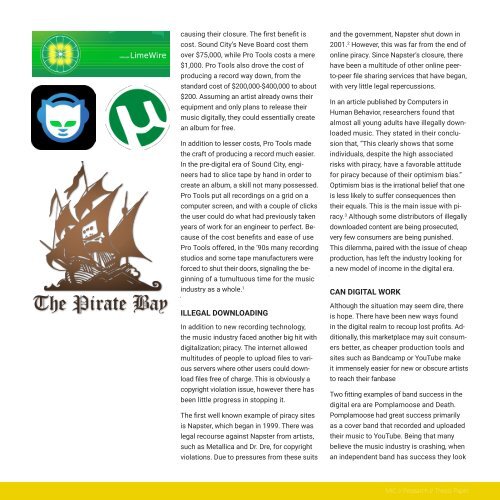You also want an ePaper? Increase the reach of your titles
YUMPU automatically turns print PDFs into web optimized ePapers that Google loves.
causing their closure. The first benefit is<br />
cost. Sound City’s Neve Board cost them<br />
over $75,000, while Pro Tools costs a mere<br />
$1,000. Pro Tools also drove the cost of<br />
producing a record way down, from the<br />
standard cost of $200,000-$400,000 to about<br />
$200. Assuming an artist already owns their<br />
equipment and only plans to release their<br />
music digitally, they could essentially create<br />
an album for free.<br />
In addition to lesser costs, Pro Tools made<br />
the craft of producing a record much easier.<br />
In the pre-digital era of Sound City, engineers<br />
had to slice tape by hand in order to<br />
create an album, a skill not many possessed.<br />
Pro Tools put all recordings on a grid on a<br />
computer screen, and with a couple of clicks<br />
the user could do what had previously taken<br />
years of work for an engineer to perfect. Because<br />
of the cost benefits and ease of use<br />
Pro Tools offered, in the ‘90s many recording<br />
studios and some tape manufacturers were<br />
forced to shut their doors, signaling the beginning<br />
of a tumultuous time for the music<br />
industry as a whole. 1<br />
ILLEGAL DOWNLOADING<br />
In addition to new recording technology,<br />
the music industry faced another big hit with<br />
digitalization; piracy. The internet allowed<br />
multitudes of people to upload files to various<br />
servers where other users could download<br />
files free of charge. This is obviously a<br />
copyright violation issue, however there has<br />
been little progress in stopping it.<br />
The first well known example of piracy sites<br />
is Napster, which began in 1999. There was<br />
legal recourse against Napster from artists,<br />
such as Metallica and Dr. Dre, for copyright<br />
violations. Due to pressures from these suits<br />
and the government, Napster shut down in<br />
2001. 2 However, this was far from the end of<br />
online piracy. Since Napster’s closure, there<br />
have been a multitude of other online peerto-peer<br />
file sharing services that have began,<br />
with very little legal repercussions.<br />
In an article published by Computers in<br />
Human Behavior, researchers found that<br />
almost all young adults have illegally downloaded<br />
music. They stated in their conclusion<br />
that, “This clearly shows that some<br />
individuals, despite the high associated<br />
risks with piracy, have a favorable attitude<br />
for piracy because of their optimism bias.”<br />
Optimism bias is the irrational belief that one<br />
is less likely to suffer consequences then<br />
their equals. This is the main issue with piracy.<br />
3 Although some distributors of illegally<br />
downloaded content are being prosecuted,<br />
very few consumers are being punished.<br />
This dilemma, paired with the issue of cheap<br />
production, has left the industry looking for<br />
a new model of income in the digital era.<br />
CAN DIGITAL WORK<br />
Although the situation may seem dire, there<br />
is hope. There have been new ways found<br />
in the digital realm to recoup lost profits. Additionally,<br />
this marketplace may suit consumers<br />
better, as cheaper production tools and<br />
sites such as Bandcamp or YouTube make<br />
it immensely easier for new or obscure artists<br />
to reach their fanbase<br />
Two fitting examples of band success in the<br />
digital era are Pomplamoose and Death.<br />
Pomplamoose had great success primarily<br />
as a cover band that recorded and uploaded<br />
their music to YouTube. Being that many<br />
believe the music industry is crashing, when<br />
an independent band has success they look<br />
<strong>MIC</strong> // Research // Thesis Paper





